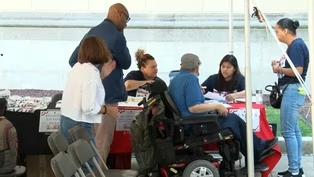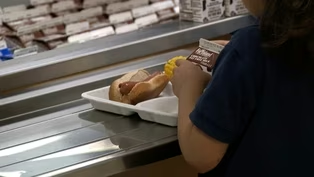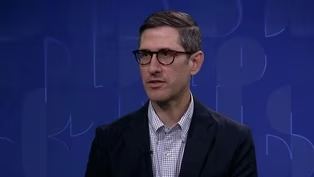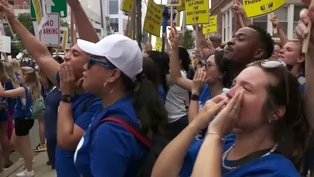NJ Spotlight News
Child poverty spikes after pandemic benefits expire
Clip: 9/14/2023 | 5m 11sVideo has Closed Captions
Peter Chen, senior policy analyst, NJ Policy Perspective
Child poverty in the U.S. has more than doubled in the year since pandemic-related federal benefits ended. Millions of families lost the extra cash, which many reported using for basics, like emergency car repairs, rent and food. New Jersey lawmakers took steps to keep the child tax credit in place. Advocates are calling for it to be made permanent at the federal level and expanded.
Problems playing video? | Closed Captioning Feedback
Problems playing video? | Closed Captioning Feedback
NJ Spotlight News is a local public television program presented by THIRTEEN PBS
NJ Spotlight News
Child poverty spikes after pandemic benefits expire
Clip: 9/14/2023 | 5m 11sVideo has Closed Captions
Child poverty in the U.S. has more than doubled in the year since pandemic-related federal benefits ended. Millions of families lost the extra cash, which many reported using for basics, like emergency car repairs, rent and food. New Jersey lawmakers took steps to keep the child tax credit in place. Advocates are calling for it to be made permanent at the federal level and expanded.
Problems playing video? | Closed Captioning Feedback
How to Watch NJ Spotlight News
NJ Spotlight News is available to stream on pbs.org and the free PBS App, available on iPhone, Apple TV, Android TV, Android smartphones, Amazon Fire TV, Amazon Fire Tablet, Roku, Samsung Smart TV, and Vizio.
Providing Support for PBS.org
Learn Moreabout PBS online sponsorshipIn the years since federal pandemic benefits ended, child poverty in the US has more than doubled.
The U.S. Census Bureau on Tuesday released annual poverty statistics and found the child poverty rate rose from just over 5% to nearly 12 and a half percent between 2021 and 2022 largely because the expansion of the child tax credit ended.
Millions of families lost the extra cash, with many reported using it for basics like emergency car repairs, rent and food.
New Jersey lawmakers took steps to keep the child tax credit in place, but advocates are calling for it to be made permanent at the federal level and expanded further so that older kids and more low income households qualify.
Pointing to the direct impact, the credit made four millions of lives.
And what we've proved is that poverty for children in America is not some accident.
It's a policy choice This moral obscenity of the richest nation in the world having the highest poverty rates is not an accident.
It's not destiny.
It's not inevitability.
It is people in this institution making a policy choice.
And joining me now is the senior policy analyst for New Jersey Policy Perspective, Peter Chen.
Good to have you with me.
We just heard Senator Booker say this comes down to a choice in America.
You all have been advocating for quite some time about expanding the child tax credit.
Talk to me quickly just about the differences between New Jersey, extending an expanded version of this versus what the federal option was.
Sure.
The federal child tax credit, which was expanded during 2021, gave families up to 3,600 per child if they were under age six and $3,000 for all other kids on an annual basis and also broke it up into monthly payments.
Whereas New Jersey's child tax credit, which is a great advance, will next year be handing out $1,000 for qualifying families, but only applies to kids under age six.
So it doesn't apply to older kids.
So we're talking about the difference of what's a pretty large chunk of money for a lot of families.
How do we see it affect or does it affect what happens in our child poverty rates?
So unfortunately, we don't have the data yet because the program is so new.
You know, we don't have the the numbers from this year.
But I do think that it's clear from the federal data that if you give families money, they can reduce child poverty.
This is what Senator Booker refers to and talking about it as a policy choice.
We can choose to reduce child poverty if we're willing to give families money in order to help them make ends meet.
It's a basic calculus.
Poverty is a lack of money.
And if you want to stop people from having too little money, you can send the money as part of a child tax credit program.
So can it or is it safe to assume that, seeing that the numbers have doubled, you know, 5.2 to 12.4% nationally from 2021 to 2022 and child poverty Is it safe to assume that that is a direct correlation with some of the pandemic era funding dropping off, or is that a stretch to be able to point to that directly?
Well, I think it's very clear that the end of the child tax credit payments led directly to the increase in child poverty in 2022.
There's plenty of data to back that up both on the census side as well as with external experts.
But I think again, fundamentally we can see that child poverty had been stubbornly high for years and years and years and years.
Here comes the child tax credit boom.
It goes down to 5%, climbs right back up as soon as those payments go away.
And this goes back to this question of a policy choice and really a political choice.
You know, do we have the political will to say child poverty in America, in New Jersey is a disgrace?
You know, we're talking about one in eight children in the United States.
That the wealthiest country in the world who live in poverty, poverty is $30,000 for a family of four.
You know, I think about my own checkbook, my own bank account and two kids at home.
You know, I sometimes think about, oh, you know what?
Maybe I'm going to have to forego a certain cost or maybe we're going to have to go a different summer camp this year.
I can't imagine.
Could I do that for $30,000 a year?
They can barely cover rent, food, maybe some basic needs.
So given that is the child tax credit, where it stands enough to make a dent in what these families are up against?
I mean, that the credit is great, but it needs to expand even more.
But what it can do is help families make ends meet to help, you know, smooth over those kinds of bumps and financial shocks that can throw family into poverty, that can make families go hungry or lose their home to lose their car.
And that's what that money is really effective for.
Peter Chen is senior policy analyst with the New Jersey Policy Perspective.
Peter, thanks so much.
Thanks
Advocates for people with disabilities rally to get out vote
Video has Closed Captions
Clip: 9/14/2023 | 3m 21s | Important for 'legislators to understand and become aware of our issues' (3m 21s)
Port Authority tests self-driving shuttles at Newark airport
Video has Closed Captions
Clip: 9/14/2023 | 1m 2s | It's the first time autonomous vehicles have been used on public roads in New Jersey (1m 2s)
A push for universal free school lunches in NJ
Video has Closed Captions
Clip: 9/14/2023 | 3m 57s | Some lawmakers hope for phase-in by 2028 (3m 57s)
Video has Closed Captions
Clip: 9/14/2023 | 4m 22s | Reader-friendly version of NJ fiscal report now required by law (4m 22s)
Striking nurses resume talks with RWJ University Hospital
Video has Closed Captions
Clip: 9/14/2023 | 4m 22s | Union 'frustrated' no round-the-clock talks; hospital says union 'misrepresents' facts' (4m 22s)
Providing Support for PBS.org
Learn Moreabout PBS online sponsorship
- News and Public Affairs

Top journalists deliver compelling original analysis of the hour's headlines.

- News and Public Affairs

FRONTLINE is investigative journalism that questions, explains and changes our world.












Support for PBS provided by:
NJ Spotlight News is a local public television program presented by THIRTEEN PBS




